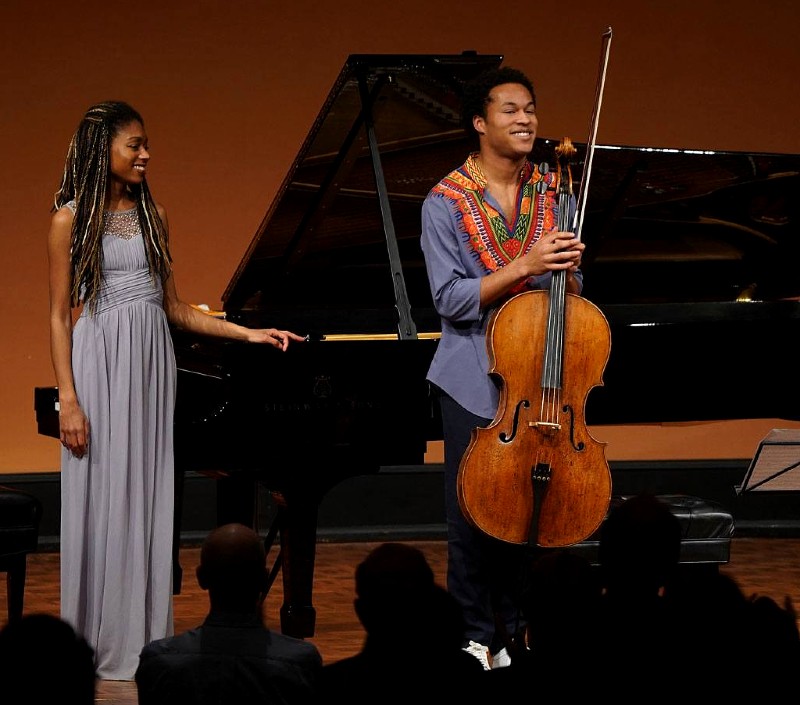In-Sync Siblings: Sheku Kanneh-Mason and Isata Kanneh-Mason's concert for UMS

On October 25, siblings Sheku Kanneh-Mason (cello) and Isata Kanneh-Mason (piano) played a free concert exclusively for UMS from the music room of their home in Nottingham, England. Presented by U-M alum and NFL great Braylon Edwards, the concert was available to stream through November 4 on UMS’s website.
Sheku was supposed to play in Ann Arbor twice this year: once with the Chineke! Orchestra and another performance with the City of Birmingham Orchestra and Chorus but both performances were canceled.
Like many others, I was introduced to Sheku Kanneh-Mason when he performed at Prince Harry and Meghan Markle’s 2018 royal wedding, an event watched by more than two billion people worldwide. During that performance, he played with an intense connection to his instrument that was admirable and captivating. Sheku's won the Classic Brit Award and the Royal Philharmonic Society Young Instrumentalist Duet Prize, and he's also released two albums to date, Inspiration and Elgar. Isata is also a wonderful artist who released her debut album, Romance, which topped the UK classical charts in 2019. She’s also currently a graduate scholar at London’s Royal Academy of Music. The duo and their five other siblings make up the classical group The Kanneh-Masons, once called the “world’s most talented family” by Simon Cowell. The group just released their first album, Carnival.
The concert consisted of two pieces: Beethoven’s Sonata No. 4 in C major, Op. 102, No. 1 and Rachmaninoff’s Sonata for Cello and Piano in G minor, Op. 19. They also encored with "XIII Le cygne (The Swan)" from Camille Saint-Saëns' The Carnival of the Animals, which can be found on The Kanneh-Masons' family album.
The extroverted Sheku plays with a deep passion that's expressed all over his face and demeanor. In contrast, Isata plays with more reserve, offering controlled tenderness and sweetness.
The Sonata No. 4 in C major, Op. 102, No. 1 starts off andante, a slower walking pace, and then abruptly changes into a speedy allegro. Isata’s fingers quickly but gracefully flew across the piano keys during the allegro section, but the siblings were in perfect sync throughout both movements.
By playing only the first part of the Beethoven sonata, the duo was able to save some energy to tackle the entirety of Rachmaninoff’s Sonata for Cello and Piano in G minor, Op. 19, which runs about 35 minutes with no breaks.
Rachmaninoff’s sonata features heavy, thick chords and wide octaves on the piano score, and these motifs are echoed and expanded upon by the cello. It requires intense coordination from both musicians and Sheku and Isata were up for the challenge. Throughout the performance, the camera switched back and forth between both artists, allowing you to observe them up close.
The final section of the Rachmaninoff, the Allegro Mosso, was a personal favorite. This piece requires quick movement with agile staccato notes appearing abruptly after a slower more mellow movement. It requires exceeding precision and the siblings pulled it off perfectly. This piece leaves no room for boredom; just when it appears to be relaxing, it quickly picks up momentum.
The encore was a piece some might not recognize by name, but Saint-Saëns' "XIII Le cygne (The Swan)" is a staple of cello-piano duets and the most popular section of The Carnival of the Animals. It’s short enough for an encore and familiar enough to leave audiences feeling refreshed and wanting more.
Despite not being able to perform in front of an in-person audience, the Kanneh-Masons still delivered an intimate and captivating performance. During these uncertain times, sometimes that’s all we need.
Sean Copeland is a recording artist, music producer, writer, and AADL staff member.


































